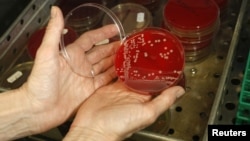New research suggests megadoses of vitamin B3 may be able to help our bodies fight some of the world’s deadliest bacteria or “superbugs.”
When given in doses far higher than found in any normal diet, scientists say the common nutritional supplement, vitamin B3, boosts the immune system by as much as 1,000 fold, and can kill a life-threatening infection called methicillin-resistant Staphyloccocus aureus, or MRSA.
U.S. public health officials report that more Americans now die from MRSA each year than from AIDS. In 2005, more than 18,000 deaths were attributed to MRSA. About 16,000 people in the United States died from AIDS that year.
George Liu, a pediatric infectious diseases physician at Cedars-Sinai Medical Center in Los Angeles, led a team investigating B3’s potential to kill the superbug in both mice and samples of human blood.
The researchers found very high doses of B3 stimulate a gene involved in the production of specialized immune cells called neutrophils. These cells destroy and sweep away harmful bacteria, boosting the immune system response to Staph and MRSA by anywhere from 100 percent to 1,000 percent.
Liu explained that megadoses of B3, known scientifically as nicotinamide, do not kill the pathogens directly.
“What it does is it hits the white cells in our body and makes them much more potent so they can come about and kill some of the Staph aureus and MRSA,” he said.
Liu said researchers discovered vitamin B3’s potential to fight superbugs by studying a group of people with a mutated copy of the neutrophils gene, who suffered from severe, chronic infections.
Liu cautions people not to try to boost their immune systems with the inexpensive, easily available dietary supplement.
“Because we don’t know a lot of information about what’s the dose and if we take too high of a level what could be the potential side effects, we must caution that this has to be done very carefully. And we would not suggest anybody to go into the vitamin store to purchase B3 to help their own immune system,” Liu said.
At this point there is no evidence that megadoses of nicotinamide cause significant side effects, but Liu said that still needs to be determined, along with the correct dose to fight drug-resistant Staph infections like MRSA.
An article by Liu and colleagues on vitamin B3’s potential to fight superbugs is published in the September issue of The Journal of Clinical Investigation.
When given in doses far higher than found in any normal diet, scientists say the common nutritional supplement, vitamin B3, boosts the immune system by as much as 1,000 fold, and can kill a life-threatening infection called methicillin-resistant Staphyloccocus aureus, or MRSA.
U.S. public health officials report that more Americans now die from MRSA each year than from AIDS. In 2005, more than 18,000 deaths were attributed to MRSA. About 16,000 people in the United States died from AIDS that year.
George Liu, a pediatric infectious diseases physician at Cedars-Sinai Medical Center in Los Angeles, led a team investigating B3’s potential to kill the superbug in both mice and samples of human blood.
The researchers found very high doses of B3 stimulate a gene involved in the production of specialized immune cells called neutrophils. These cells destroy and sweep away harmful bacteria, boosting the immune system response to Staph and MRSA by anywhere from 100 percent to 1,000 percent.
Liu explained that megadoses of B3, known scientifically as nicotinamide, do not kill the pathogens directly.
“What it does is it hits the white cells in our body and makes them much more potent so they can come about and kill some of the Staph aureus and MRSA,” he said.
Liu said researchers discovered vitamin B3’s potential to fight superbugs by studying a group of people with a mutated copy of the neutrophils gene, who suffered from severe, chronic infections.
Liu cautions people not to try to boost their immune systems with the inexpensive, easily available dietary supplement.
“Because we don’t know a lot of information about what’s the dose and if we take too high of a level what could be the potential side effects, we must caution that this has to be done very carefully. And we would not suggest anybody to go into the vitamin store to purchase B3 to help their own immune system,” Liu said.
At this point there is no evidence that megadoses of nicotinamide cause significant side effects, but Liu said that still needs to be determined, along with the correct dose to fight drug-resistant Staph infections like MRSA.
An article by Liu and colleagues on vitamin B3’s potential to fight superbugs is published in the September issue of The Journal of Clinical Investigation.




